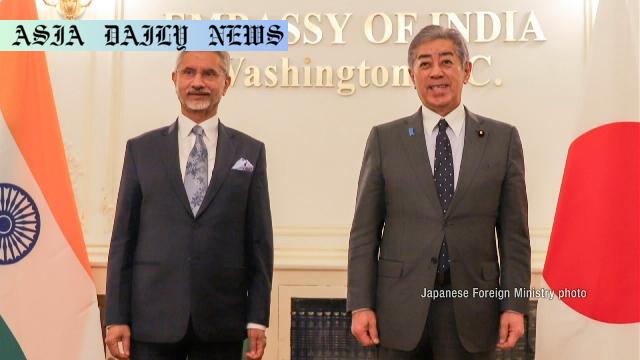Foreign ministers Iwaya Takeshi and Subrahmanyam Jaishankar discuss collaboration in security, economy, and technology under the Quad framework.
Japan and India reaffirm bilateral cooperation during US transition.
Focus on Quad framework collaboration with the US and Australia.
Plans for India’s PM Modi to visit Japan soon.
Designation of ‘Japan India Science Technology and Innovation Exchange Year’.

In a significant diplomatic meeting held in Washington, Japan’s Foreign Minister Iwaya Takeshi and India’s Foreign Minister Subrahmanyam Jaishankar reaffirmed the importance of deepening bilateral cooperation between their two countries. This reaffirmation comes at a critical time as the global community prepares for the transition to a new US administration. The meeting underscored the shared commitment of Japan and India to peace and prosperity on an international scale, with the ministers recognizing their countries’ responsibility to lead in these areas.
The discussions delved into multiple areas of collaboration, focusing particularly on the Quad framework, which also includes the United States and Australia. The Quad has become increasingly significant as a strategic partnership aimed at ensuring a free, open, and inclusive Indo-Pacific region. Both ministers emphasized the importance of coordination among Quad members to address regional and global challenges, particularly in the areas of security, economic recovery, and pandemic response mechanisms.
Ahead of the expected visit by Indian Prime Minister Narendra Modi to Japan, both countries are looking to further strengthen their bilateral relationship. The ministers expressed a mutual desire to fortify ties in diverse fields, including defence, technological innovation, and economic partnership. Notably, they agreed to designate the year starting in April as “Japan India Science Technology and Innovation Exchange Year.” This initiative aims to foster greater collaboration in scientific research and technological advancements, opening avenues for innovation-driven growth in both nations.
On the economic front, the ministers discussed strategies for enhancing trade and investment between their countries. This includes exploring opportunities in emerging sectors such as renewable energy, artificial intelligence, and digital infrastructure. Recognizing the rapid advancements in technology, both sides highlighted the importance of innovation in shaping the future economic landscape and agreed to facilitate increased interactions between their scientific communities.
The timing of this collaboration is also significant as the ministers discussed the ongoing arrangements for a meeting between Japanese Foreign Minister Iwaya and Marco Rubio, the nominee for US Secretary of State under the forthcoming administration. A meeting of Quad foreign ministers is also under discussion, which would provide a platform for further strengthening this multilateral partnership and addressing pressing global issues such as climate change, cybersecurity, and supply chain resilience.
In remarks given at the beginning of their meeting, Iwaya emphasized the shared democratic values and principles that underpin the Japan-India relationship. Both ministers acknowledged the need to uphold these principles in international forums while tackling challenges such as regional tensions and maritime security threats.
As the global geopolitical landscape continues to shift, partnerships like that of Japan and India are critical in promoting stability, fostering economic growth, and addressing challenges that transcend borders. The reaffirmation of bilateral cooperation and the focus on mutual advancement through science, technology, and innovation demonstrate the forward-looking vision embraced by these two nations. This collaborative spirit not only enhances their bilateral relationship but also contributes to the broader goals of regional and global prosperity.



Commentary
The reaffirmation of bilateral cooperation between Japan and India comes at a pivotal moment for the global political and economic landscape. With a transition of power in the United States and an increasingly complex geopolitical environment, partnerships like this provide a stable foundation for fostering peace, prosperity, and innovation. The prioritization of collaboration under the Quad framework demonstrates not just a focus on regional stability in the Indo-Pacific, but also a commitment to addressing global challenges collectively.
One of the most significant aspects of this partnership is the focus on science, technology, and innovation. By designating the upcoming year as the “Japan India Science Technology and Innovation Exchange Year,” both nations are showcasing their commitment to leveraging these fields for mutual growth. This is particularly relevant in a world that is becoming more digitalized and interconnected. Investments in technology, artificial intelligence, and digital infrastructure will undoubtedly play a pivotal role in shaping the future economies of both nations and beyond.
Moreover, the emphasis on economic collaboration, especially in emerging sectors like renewable energy and green technologies, indicates a shared commitment to combating some of the most pressing challenges of our time, such as climate change. These areas will likely serve as the next frontier of economic growth and innovation for both countries. It’s heartening to see leaders recognize the importance of aligning their national priorities towards global sustainability goals.
The focus on the Quad framework also reflects a growing understanding of shared responsibilities in the Indo-Pacific region. With increasing maritime tensions and regional security challenges, partnerships like the Quad provide a critical platform for democratic nations to address these issues cohesively. The commitment to a rules-based order and inclusive governance ensures that smaller nations in the region also benefit from such alliances.
In essence, the reaffirmation of Japan-India cooperation highlights the potential of diplomacy and strategic partnerships in driving progress on multiple fronts. This relationship is not merely about bilateral benefits but serves as a beacon of cooperative efforts in an increasingly fragmented world. One can hope that such partnerships will inspire other nations to focus on collective progress and shared values rather than division and conflict.